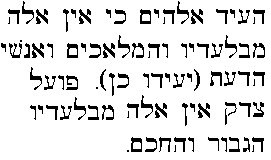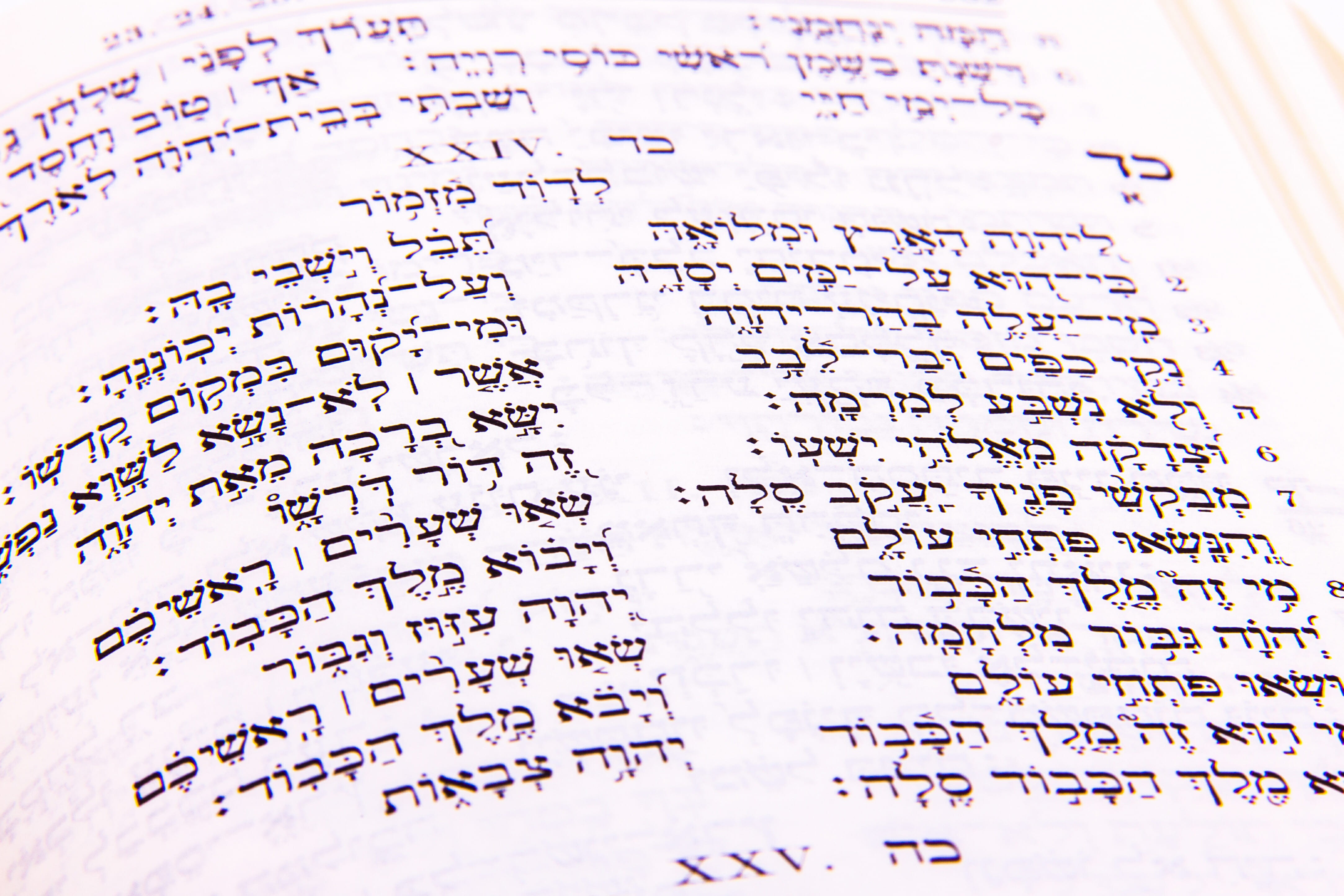Often the missionaries try to argue that the alleged ” divine name” for God is Yahweh, and that since the word  (Allah) is not etymologically related to this name, it therefore follows that Muslims worship a different deity. However, what they fail to recognise is that it is etymologically accepted that the root word of
(Allah) is not etymologically related to this name, it therefore follows that Muslims worship a different deity. However, what they fail to recognise is that it is etymologically accepted that the root word of  (Elohim) which is eloh, is indeed :
(Elohim) which is eloh, is indeed :
[…]a cognate form of the word allah, the designation of deity used by the Arabs.1
This cannot be better exemplified than to see it in a Hebrew translation of the Qur’an.
The Hebrew Qur’an : A Brief History

Some explanation of the history behind the Hebrew translation of the Qur’an is needed. The journey of translating the Qur’an into Hebrew is marked by notable milestones, beginning with the pioneering work of Hermann Reckendorf in 1857. This German Jewish scholar’s efforts opened the path for further translations, each adding layers of depth and understanding to the cross-cultural engagement with the Islamic holy text.
In 1936, Joseph Joel Rivlin (Yosef Yo’el Rivlin) offered a new perspective with his translation, followed by Aharon Ben Shemesh’s version in 1971. The tradition of translating the Qur’an into Hebrew was continued by Uri Rubin, whose translation was published in 2005 by Tel Aviv University Press.
Each of these translations has contributed to a richer understanding of the Qur’an’s teachings, underscoring the profound connection between Semitic languages and the monotheistic religions that employ them to articulate their spiritual doctrines. By rendering the Qur’an in Hebrew, translators have not only facilitated academic and religious study but also highlighted the intricate web of linguistic and theological ties uniting Islam and Judaism.
Content Overview
Examples of Elohim In The Hebrew Qur’an
The following are some examples from the Hebrew translation of the Qur’an by Joseph Joel Rivlin, whereby the word “elohim” is consistently translated from the Arabic “allah” from the Qur’an in its original Arabic.
Quran 1:1
This appears in Qur’an 1:1 (Sura’ al-Fatiha) of the Hebrew translation2 :

B’shem Elohim, ha-Rachamān, v’ha-Rachum
Compare it with the very same verse in the Arabic Qur’an :

Bismi Allāhi r‑Raḥmāni r‑Raḥīm
Both translate into English as : “In the name of God, Most Gracious, Most Merciful.“3
Apart from the example given above, we would like to present more examples from the Hebrew translation of the Qur’an, which uses the word Elohim and Eloh. Note that the Hebrew translation always renders Ilah and Allah as Eloh and Elohim, respectively.
Quran 3:2
The following appears in Qur’an 3:2 of the Hebrew translation :

Elohim, ein eloh mibbal’adaiv, ha-Chai, ha-Qayam
The original Arabic rendering of Qur’an 3:2 is :

Allāhu lā ilāha illā huwal-ḥayyul-qayyūm
which translates into English as : “God ! There is no god but He, the Living, the Self-Subsisting, Eternal”.
Quran 3:18
The next image appears in Qur’an 3:18 of the Hebrew translation :

He’id Elohim ki ein eloh mibbal’adaiv, v’ha-Malakhim v’Anshei hada’at ya’idu ken
The original Arabic rendering of Qur’an 3:18 would be :

Shahida Allāhu innahu lā ilāha illā huwa wal-malā’ikatu wa ulul-‘ilmi qā’iman bil-qisṭi lā ilāha illā huwal-‘azīzul-ḥakīm
This translates into English as : “There is no god but He : That is the witness of God, His angels, and those endued with knowledge, standing firm on justice. There is no god but He, The Exalted in Power, The Wise”.
Quran 6:1
This last example is from Qur’an, 6:1 of the Hebrew translation :

HaT’tchilah L’Elohim, asher bara et ha-shamayim v’et ha-arets, v’ya’as afelah v’orah…
The Arabic from Qur’an, 6:1 is :

Al-ḥamdu lillāhil-ladhī khalaqas-samāwāti wal-arḍa waja’ala aẓ-ẓulumāti wan-nūr…
The English translation is : “Praise be to God, Who created the heavens and the earth and made the darkness and the light.…”
Conclusions
The linguistic evidence linking “Allāh” in Arabic to “Elohim” in Hebrew not only highlights the common Semitic roots shared by these languages but also illuminates the shared concept of monotheism that is central to Islam, Judaism, and Christianity. This connection transcends mere phonetic similarities, delving into the historical and linguistic evolution within the Semitic language family. The instances of “Allāh” used in the Arabic Bible and “Elohim” in Hebrew translations of the Qur’an underscore the acknowledgment of a singular, supreme deity across these Abrahamic faiths, challenging the notion of worship directed towards fundamentally different entities.
This linguistic correlation effectively counters misconceptions aimed at segregating the concept of God in Islam from that in Judaism and Christianity. It particularly addresses unfounded assertions, such as the claim that Allāh refers to a moon god, by showcasing the consistent translation and application of “Allāh” and “Elohim” within monotheistic contexts. This serves to highlight a shared theological foundation that transcends cultural and linguistic distinctions, firmly rooted in the worship of one God.
The use of “Allāh” by Arabic-speaking Christians and Jews, alongside “Elohim” in the Hebrew Qur’an, solidifies the universality of God across these traditions, without conflating the unique theological positions concerning the nature of God, as seen in the Christian doctrine of the Trinity and the strict monotheism of Islam and Judaism. This distinction is crucial, as it respects the theological boundaries that define each faith while acknowledging their common monotheistic heritage.
Insha’Allah, the linguistic relationship between “Allāh” and “Elohim” reaffirms the monotheistic essence shared by Islam, Judaism, and Christianity, challenging divisive narratives with a reminder of their intertwined historical and linguistic legacies. This connection does not dilute the unique theological nuances of each faith but rather emphasizes the core belief in a singular, omnipotent deity that underpins the Abrahamic traditions.
And only God knows best !
- W.E. Vine, Merrill F. Unger, William White Jr., Vine’s Complete Exposition Dictionary, Thomas Nelson Publishers, Nashville, TN, 1996.[↩]
- See Yosef Yo’el Rivlin, Alkur’an /tirgem me-‘Arvit, Devir, Tel Aviv (1936−1945). More information is available here.[↩]
- We have referred to A. Yusuf Ali, The Holy Qur’an : Text, Translation, and Commentary for the English translation of the Basmalah and the later translations of the Quranic verses involved.[↩]


Leave a Reply